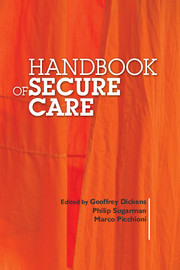Book contents
- Frontmatter
- Contents
- List of tables, boxes and figures
- List of contributors
- Preface
- 1 The evolution of secure and forensic mental healthcare
- 2 Mental disorder and offending
- 3 Clinical risk assessment in secure care
- 4 Risk management in secure care
- 5 Recovery in secure environments
- 6 Personality disorder
- 7 Women's mental health, aggression and offending
- 8 Offenders with intellectual disability in secure services and the criminal justice system
- 9 Secure mental healthcare for young people
- 10 Secure care for people with autism spectrum disorder
- 11 Acquired brain injury, trauma and aggression
- 12 Managing aggression and violence in older people
- 13 Firesetting in secure settings: theory, treatment and management
- 14 Specialist psychological treatment programmes in secure mental healthcare
- 15 Nursing in secure mental healthcare settings
- 16 Prescribing for specialist populations
- 17 Human rights in secure psychiatric care
- 18 Quality assurance and clinical audit in secure psychiatric care
- 19 Psychological support following violent assault and trauma: what works for staff in secure settings?
- Index
15 - Nursing in secure mental healthcare settings
Published online by Cambridge University Press: 02 January 2018
- Frontmatter
- Contents
- List of tables, boxes and figures
- List of contributors
- Preface
- 1 The evolution of secure and forensic mental healthcare
- 2 Mental disorder and offending
- 3 Clinical risk assessment in secure care
- 4 Risk management in secure care
- 5 Recovery in secure environments
- 6 Personality disorder
- 7 Women's mental health, aggression and offending
- 8 Offenders with intellectual disability in secure services and the criminal justice system
- 9 Secure mental healthcare for young people
- 10 Secure care for people with autism spectrum disorder
- 11 Acquired brain injury, trauma and aggression
- 12 Managing aggression and violence in older people
- 13 Firesetting in secure settings: theory, treatment and management
- 14 Specialist psychological treatment programmes in secure mental healthcare
- 15 Nursing in secure mental healthcare settings
- 16 Prescribing for specialist populations
- 17 Human rights in secure psychiatric care
- 18 Quality assurance and clinical audit in secure psychiatric care
- 19 Psychological support following violent assault and trauma: what works for staff in secure settings?
- Index
Summary
Introduction
This chapter appraises the evidence for nursing in secure mental health environments as a specialty branch of mental health nursing. It opens with a brief history of nursing in secure and forensic mental health settings in England, describes the claims made for specialist status and identifies the main definitions and theories of mental health nursing in secure care. The worldwide empirical research evidence about the distinguishing features of the role is reviewed. It is concluded that nursing in secure care requires specialist skills and knowledge related to security, risk, therapeutic activity and clinical specialism. However, nurses working in secure services share many key mental health nursing attributes with those working in mainstream mental health services. Shared characteristics include teamwork, communication and professional development. Core values of both include a recovery and equality focus and commitment to evidencebased practice. Nurses should utilise the best evidence from all settings to support their practice, adapting where necessary to meet the clinical and security needs of the diverse groups for whom they provide care.
A brief history of nursing in secure mental healthcare
In England, nursing in conditions of security is rooted in the development of asylums for the criminally insane (Dale et al, 2001), the first at Broadmoor (opened 1863) and the second at Rampton (1914). Also in 1914, a state institution for people with intellectual disability (then known as mental retardation) of ‘dangerous or violent propensities’ (Mental Deficiency Act 1913) was opened at Moss Side on Merseyside (McGrath, 1966). However, there were no nurses, only ‘attendants’, at Broadmoor until the introduction in 1938 of a nursing examination (Hamilton, 1980). A nursing school was opened at Rampton hospital in 1950 (Nottinghamshire Healthcare NHS Trust, 2007). Until the Mental Health Act 1959 designated all three institutions as ‘special hospitals’ responsible to the Ministry for Health they had been an arm of the criminal justice system responsible to the Home Office. Despite the new healthcare alignment of the hospitals, nurses were solely represented in employment negotiations by the Prison Officers Association until the mid-1990s (Murphy, 1997). Nurses were also considered to be civil servants, until 1979 subject to the Official Secrets Act, resulting in a climate of secrecy about nursing activity in the special hospitals during this period (Kirby, 2000).
- Type
- Chapter
- Information
- Handbook of Secure Care , pp. 231 - 251Publisher: Royal College of PsychiatristsPrint publication year: 2015



